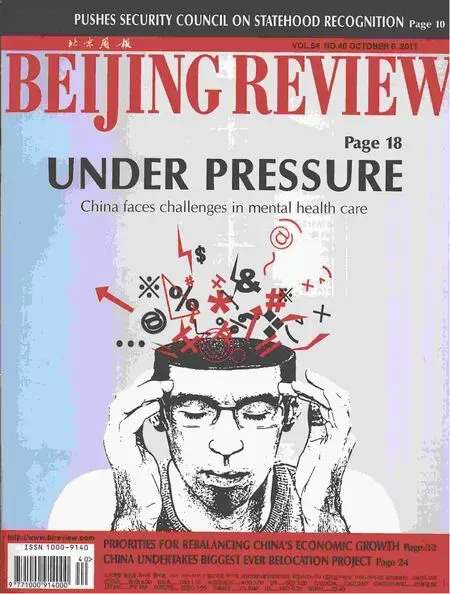A MENTAL CHALLENGE
2011-10-14ByYINPUMIN
By YIN PUMIN
A MENTAL CHALLENGE
By YIN PUMIN
New law in the works to improve care for mentally ill persons

BEING TOGETHER: Volunteers from Fujian Medical University play games with mentally ill patients at a park in Fuzhou, capital of southeast China’s Fujian Province
Xu Wu, a former firefighter with the Wuhan Iron and Steel (Group) Corp.(WISCO), a state-owned steelmaker in central China’s Hubei Province,finally returned to his family in early June.
The 43-year-old claimed he had been incorrectly diagnosed with paranoid personality disorder and kept in a psychiatric rehabilitation facility for more than four years. He insisted he had been sent to the facility because his employer wanted to punish him for his longstanding petitioning over a wage dispute.
On three occasions Xu was diagnosed with mental illness. Xu’s parents said they were forced to sign an agreement to send their son to mandatory treatment, and entrusted lawyers and psychiatrists to evaluate Xu’s condition in 2009, but were refused access to their son during that time.
On May 12, Xu was re-diagnosed by several prominent psychiatrists who said although he suffered from paranoia that did require treatment, he did not need involuntary hospitalization.
In recent years, repeated media reports about sane people misidenti fi ed as mentally ill have raised awareness and concern of the issue across China.
“In some cases, the police or the employer forced people to be mentally assessed,and then sent them to mental institutions,”said Wang Xixin, a law professor at Peking University. “If this power is abused in some circumstances, any of us might be forced to undergo a psychiatric assessment.”
In the past, disorganized procedures and low standards for mental hospital admission meant that virtually any company,neighborhood committee or individual could send somebody they suspected of being mentally ill to a hospital.
“I was shocked by the irrationality of current regulations and deeply worried about the drawbacks and loopholes that could be exploited to violate any citizen’s basic rights,” said Huang Xuetao, a lawyer at the Beijing Horizon Law Firm who has been working on the issue since 2006. “Hospitals are only responsible to those who pay the fees, and as long as they pay, patients might be stuck in there forever.”
Believing few hospitalized patients represent a true danger to society, Huang favors a joint diagnosis of mental illness involving medical experts and judicial workers.
A long-awaited law
On June 10, the Legislative Affairs Of fi ce of the State Council published a draft for China’s first Mental Health Law and started soliciting public comments. The pro-posed law came after 26 years of debate over how to frame mental health legislation.
“The complexity of mental illness and lack of diagnostic standards contribute to the challenges of legislation,” said Yang Fude,President of Beijing Huilongguan Hospital,one of the best-equipped mental health institutions in China. Yang was involved in the drafting of the Mental Health Law.
Legislation on mental health has been a social focus for years. Thus the public debate on it covered many procedural details such as involuntary commitment and medical standards. According to Yang, the legislative goal, however, is always to protect the rights of mentally ill people and to standardize medical conduct.
There is already consensus among lawmakers that mental health lawmaking is both a legal and medical matter. From a medical point of view, the priority is to cure a mentally ill subject, no matter what it takes. From a legal point of view, the priority is to safeguard a patient’s basic rights, to avoid violating individual rights,and to secure the safety of the surrounding people. These different objectives sometimes contradict, and leave the public and lawmakers with a hard choice.
“Rather than pushing forward the law in a hurry, legislators should do thorough research and have clear reasoning beforehand. The purpose of legislation is to better protect the rights of the patients,” Yang said.“Legislation won’t solve the current problems if the law is hard to apply.”
The draft law sets rules on the diagnosis of mental illness and the involuntary treatment of mental health patients, stipulating except in legal circumstances, hospitals are prohibited from con fi ning anyone with mental illness against their will.
The draft also states a patient or their guardians have the right to a second quali fi ed opinion after a diagnosis. The second diagnosis must be carried out by two licensed psychiatrists. If the patient or their guardians still have doubts about the conclusion, they can apply for an assessment carried out by a forensic department quali fi ed in identifying mental illness.
According to the draft, if a patient is diagnosed with no mental illness by a forensic department, no organization or individual is allowed to continue to confine the patient.In addition, if the hospital fi nds the patient’s condition improves enough to cease involuntary treatment, it must immediately inform the patient and their guardians.
If a doctor considers a patient’s discharge from hospital inappropriate, he or she should inform the patient or his guardians about the matter, record the notification details and provide technical advice if a patient or his guardians insist on a discharge.
The draft also stipulates mentally ill people who cannot pay or have difficulties paying for treatment will receive funding and help from the central and local governments.
It also states it is the responsibility of civil affairs authorities to send homeless people suspected of suffering mental disorders to mental health institutions.
The draft law establishes the rights of mental health patients, including the right to education, work, medical insurance, privacy and social assistance.
It also stipulates community health centers should provide facilities and venues to care for mentally ill people.
Serious situations
During the review of the draft Mental Health Law, a great deal of public attention was focused on the provisions concerning diagnosis and involuntary commitment.
Some experts attribute the rise of depression cases to multiple factors, including industrialization,urbanization, a faster pace of life and other modern day stresses
Many lawyers and academics have reviewed the law to determine if it is suf fi cient to protect people from the trauma of being falsely labeled insane.
Likewise, medical and legal experts hope the proposed measure will settle questions over how to decide whether someone should be forcefully committed to an asylum, and who should make such decisions. Doctors are also waiting for decisions on drug treatment, electroshock therapy, and isolation wards.
No one, however, is debating the fact that the number of people locked away for mental disorders is excessive.
“It’s a terrible mistake,” said Huang, a lawyer in Beijing who has analyzed more than 300 news reports and 100 cases involving the hospitalization of suspected mentally ill people. “According to latest official figures, three out of every four seriously mentally ill people fail to be hospitalized due to a lack of space in institutions, but many of those hospitalized appear to be suffering no mental illness at all.”
According to the 2009 statistics released by the National Center for Mental Health, China had as many as 100 million mentally ill people, including more than 16 million who suffer from serious conditions.That means one out of 13 people were mentally disturbed and one out of 100 were seriously ill.
“The ratio is increasing rapidly,” said President Yang of Beijing Huilongguan Hospital.
According to him, cases of depression have risen the fastest in recent years and more than 26 million people need therapy.
Experts attribute the problem to multiple factors including industrialization, urbanization, a faster pace of life and other modern day stresses.
“Chinese society is changing fast and people are experiencing an increasing number of dif fi cult life events, such as changing jobs, borrowing money, or divorce, which increase stress levels,” said Qian Mingyi, a professor at Peking University’s Department of Psychology.
As a result of fi nancial dif fi culties, a lack of awareness and an absence of channels through which to seek help, only 20 percent of those suffering from serious mental illness in China have received treatment.
Mental illness has traditionally been stigmatized in China, considered a curse and family disgrace rather than a disease that can be alleviated or cured through medication and psychological counseling.
Meanwhile, 60 percent of residents in rural areas have never heard of the concept of “depression,” according to a 2009 survey led by Michael Philips, a leading psychiatrist based in Beijing Huilongguan Hospital.
Nan Zhenguo, another psychiatrist at the hospital, suggests the public be given basic knowledge about mental health. “This will not only help people treat psychiatric patients better, but guide families as to when to send patients to hospital,” he said.
In fact, many mentally ill people suffer without diagnostic knowledge of their conditions. This is especially true for those with depression. More than 63.9 percent of depression sufferers reportedly never go for therapy,and only 10 percent get proper medication.
Yang said the lack of knowledge about mental illness has resulted in the low rate of consultations, which leads to further deterioration of patients’ health.
Worse still, long years of mental illness and the resulting intake of various medicines leave sufferers subject to debilitating side-effects. Patients experience mental dullness and an inability to control their facial expressions. Their cardiovascular and cerebrovascular systems begin to shut down, and their susceptibility to cancer is also increased. Overall, they become more vulnerable to diseases and discrimination.
“The high cost of medicine often renders
patients bankrupt and places a heavy burden on their families,” Yang said.
In the end, more than 15 percent of sufferers terminate their seemingly endless agony and grief by suicide and mental patients now constitute the majority of China’s cases of suicide. Studies show the life expectancy for mentally ill people is 20 to 30 years shorter than that of the general public.
Another worrying statistics show that about 82 percent of the 1,515 people who were accused of criminal offenses and underwent psychiatric evaluation at Beijing Anding Hospital from 1984 to 1996 suffered from mental illnesses, according to a Xinhua News Agency report.
Shortage of resources
Another factor that prevents mentally ill people from receiving proper treatment is the signi fi cant shortage of psychiatric care facilities and quali fi ed psychiatrists in China.
According to the Chinese Center for Disease Control and Prevention, there were only 572 psychiatric medical institutions, 132,881 hospital beds and 16,383 certi fi ed psychiatrists in China as of 2005. Based on the statistics,there was 1.04 hospital bed for every 10,000 patients and just one psychiatrist for every 100,000 patients. Even today, the number of certified psychiatrists has only risen to 19,000.
Due to concerns about the working environment and salary, many psychiatrists prefer to work in general hospitals or psychological consultation centers, where the atmosphere is less grim.
The lack of nurses is an even greater problem. In some mental hospitals, one nurse has to attend to several dozen patients, while ordinary hospitals have a nurse-to-patient ratio of 1:2.5. The low salaries, high pressure, risk,and even social discrimination drive nurses away from careers in mental hospitals. Beijing Huilongguan Hospital reportedly loses one third of its nurses every year.

LEARNING NORMALLY: A father teaches his mentally ill son to write in Xi’an, northwest China’s Shaanxi Province
In June 2010, the Ministry of Health announced 550 psychiatric hospitals and psychiatric departments within general hospitals would be enhanced and expanded over the coming two years.
The ministry required community health centers in cities and clinics in rural areas to make a list of people with severe mental health problems and offer them counseling on a regular basis. Local health authorities were also mandated to open telephone hotlines and offer counseling services.
Vice Health Minister Yin Li said the government would step up efforts to reduce the fi nancial burden of adequate treatment on families. At the end of 2009, free consultations and therapy already started being provided nationwide to those heavily troubled by mental illness.
In order to help institutionalized patients return to their homes and ease the stress on hospitals, Nan at Beijing Huilongguan Hospital has called for the establishment of more rehabilitation centers.
“A rehabilitation center is much like a buffer zone for psychiatric patients,” Nan said. “Since they cannot get the professional medical care they need at home, some patients have been confined to hospitals for years due to a lack of rehabilitation centers,”he said.
With help from psychiatrists from Italy, the first community mental health rehabilitation center in Beijing was established in 2010. However, while modern rehabilitation institutes are trying to establish a foothold in China, many challenges remain particularly as there are insuf fi cient skilled volunteer teams to help patients in re-adapting to society.
